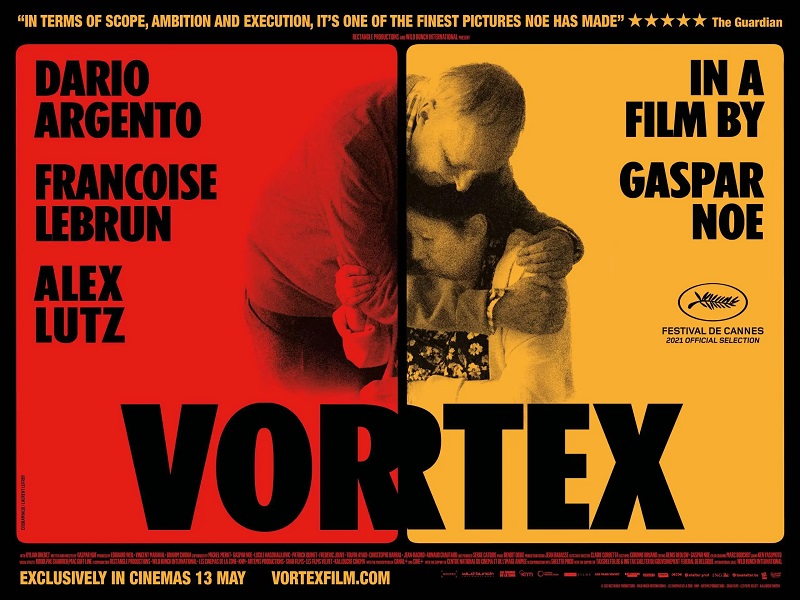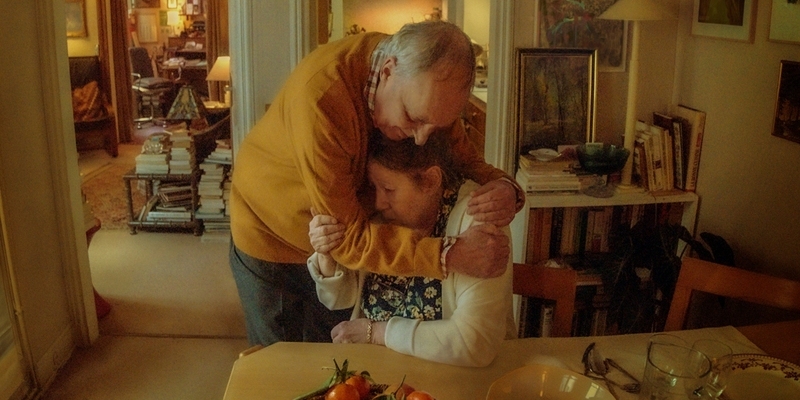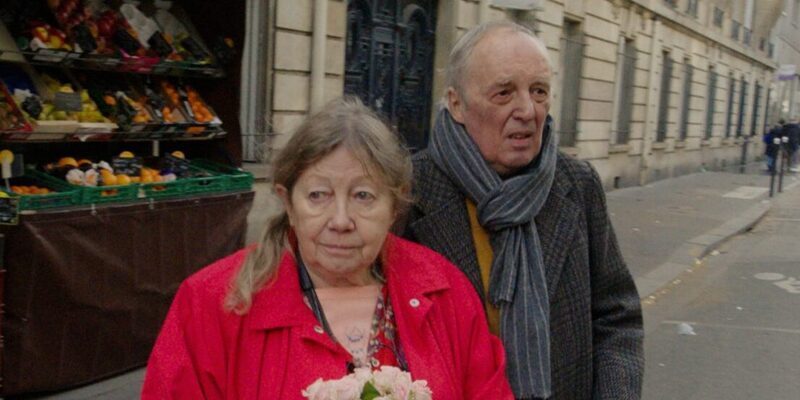
Review by
Eric Hillis
Directed by: Gaspar Noé
Starring: Dario Argento, Françoise Lebrun, Alex Lutz

There's a beautifully performed moment in Joachim Trier's recent
critical fave
The Worst Person in the World
in which a dying man looks back on his life and confesses that as he was
never much of a people person, it's the things that brought him joy
(books, records, movies), rather than the humans he loved, that he'll
miss most of all when he leaves this world. Gaspar Noé's
Vortex plays out almost exclusively in a Parisian
apartment filled with such "things," its cramped corridors lined with
books, records, DVDs and videos, with any visible wall space housing
movie posters. Of course, such artefacts aren't merely material
possessions, but the sum of a person's life of accumulating knowledge
and entertainment.

The people in question here are an octogenarian couple referred to only
as Father (Dario Argento…yes, Dario Argento!!!) and Mother (Françoise Lebrun). He's a film critic working on a book exploring the relationship
between cinema and dreams (of course he is) while she's a retired
psychiatrist who still likes to keep abreast of developments in her
field. Their apartment is what boring people would call a mess, the sort
of place that would give practitioners of Feng Shui a heart attack, but
those of us with a soul will recognise it as what we call a home.
Noé opens his film with the couple sharing an idyllic moment as they
enjoy some wine and bread on their balcony on a sunny afternoon. "Life
is a dream," Mother toasts. "A dream within a dream," Father replies.
That dream is horrifically shattered the following morning when Mother
wakes up stricken by a sudden bout of dementia. In a strikingly
effective visual metaphor, Noé splits the screen with a black bar that
drips like tar down the centre of the screen, and when it reaches the
bottom the movie maintains its split-screen image for the remainder of
its running time. Father and Mother will continue to share a physical
space but they will never be united in the same way and the image of a
blank half of the screen later on is devastating in its emptiness.

Vortex is a surprising about turn from Noé, a filmmaker
known, arguably justifiably, as a shock merchant. Here he's crafted a
movie built largely of tender human moments. When Mother's madness
strikes however, like a horrific scene in which she ruins her husband's
work, it's as disturbing as anything Noé has presented us with over the
course of his controversial career. Noé opens his film with the
dedication "To all those whose brains will decompose before their
hearts," which gets to the crux of Vortex. This is a movie about the brutal truth of aging, of everything you
built your life around suddenly becoming meaningless. As Mother descends
into dementia, what was an enviable Parisian apartment becomes nothing
more than a potential fire trap. When their son (Alex Lutz) tries
to convince the pair to move into an assisted living facility, Father
shoots down the idea because he won't be able to bring his books with
him. We can tell that the son is thinking the same thing as the
audience, that soon those books will be mere collections of paper when
Father's own mind fails, but he can't bring himself to say this to a man
who has built his life around acquiring knowledge.
Father and Mother are clearly in love, but they're not without their
troubles either. The former reacts to his wife's deterioration by
attempting to reconnect with a mistress, but it's never framed as a
treacherous act, rather a plea for help from a desperate man. "I need to
hear your voice," he tells his old lover's answering machine, and the
suggestion is that he can't live without having someone to tell him he
matters. This extends to his work too, as he makes several phone calls
to editors to let them know of ideas he's come up with (many of them
hackneyed, like opening his book with the same Poe quote that opens John
Carpenter's The Fog). We don’t hear the other end of the line but we get the impression of
some editor nodding their head out of indulgence. As much as he needs
love, Father needs respect, and the horror comes from both slowly fading
away.

Noé takes a very matter of fact, secular approach to the process of
dying, one which some viewers may feel is cold and cruel. I suspect
Vortex will play differently to viewers depending on
whether their parents are still with them or have departed this world. I
imagine if my Father and Mother were still here the movie would have
greatly disturbed me, but as they're both gone I found
Vortex oddly comforting. I found myself relating to the
couple's son as he struggles to do what's best for his parents, who
stubbornly refuse to heed his advice, and Noé's film made me feel like I
wasn't alone, that billions of people are experiencing, or will
experience, or already have gone through the same process. No matter how
spiritually inclined you might be, there's no romance in death, at least
not in western culture. There's no time to say goodbye as you're
immediately confronted with paperwork and planning at a time when you
need to just sit down and process things. Watching someone else go
through this same cold procedure is surprisingly therapeutic. Noé's
critics often describe him as immature, but Vortex is a
film of great maturity, a shock merchant exploring a subject that comes
as a shock to us all. We can't prepare for the death of a loved one but
thanks to films like Vortex, we can reflect on it.


